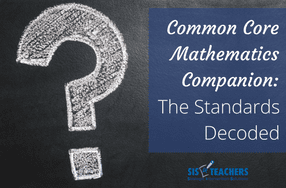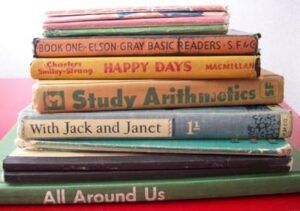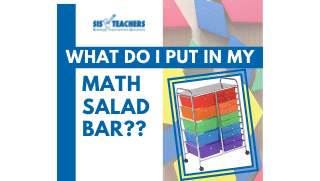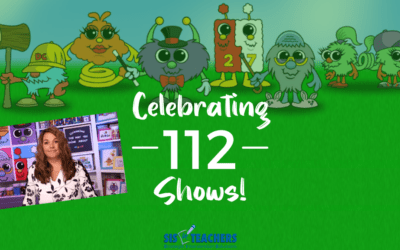My Math, Go Math, EveryDay Math, Eureka Math, Math in Focus, Math Expressions, Ready Common Core, the list goes on of math books that are published for schools to adopt! Most teachers will point to whatever book they have as their math curriculum.

However, I’ve shared my Golden Rule with teachers many times:
The district-adopted textbook is not actually our curriculum! Our curriculum is the standards that we’re teaching and the textbook is meant to be a resource in teaching those standards.
Some teachers are “page turners” who are very focused on making it through their math book, and they take great pride in making sure all the material within the book is delivered to the students. Some districts feel like, if you just follow the book, no one should struggle with number sense.
We know better. We know that we’re not working with robots. We know the reality that, if you follow the book page by page, it is not going to reach all 30 students in your class because they have a variety of differentiated needs based on their background, on their overall comprehension, math reasoning, understanding of numeracy development, and foundation of number sense.
Wouldn’t it be nice if, when you do “teach by the book” and the kid doesn’t get it, the book would tell you, “What this standard actually means is that kids can do X, Y, and Z.”
Common Core Mathematics Companion: The Standards Decoded (K-2 and 3-5), published by the National Council for Teachers of Mathematics (NCTM), is a great resource that I was introduced to by the math and science director at the Jackson County Intermediate School District that we partner with. It’s such an excellent resource that she’s given it to many of the teachers in her district to support their work in math. It’s fairly inexpensive ($25) and isn’t a “read front to back” kind of book (which we all know we don’t have time for!). The book looks at what the standards say, what the standard means, and how do you teach it. Common Core Mathematics Companion: The Standards Decoded breaks the standards down into easy, at-a-glance views. It’s not a front-to-back read, but can really be used as a reference book. For example, if you’re teaching geometry, and want to know specifically within your grade level, you could flip to that and see strategies and ways to teach that standard.
 With our golden rule in mind, that doesn’t mean your old books won’t work! Today we were working with a district that does not have a district-adopted textbook. The last published book they have was from 2009. A lot has changed in the world of mathematics in the past nine years! There are a lot of really great problems in the old math book, but it doesn’t hit the rigor of what we’re looking for in the Common Core. For example, one of the lessons that we backwards designed was looking at three addends. We wanted the students to use the associative property to add three addends together by associating two numbers together, either by making them 10, or a doubles+1 or another strategy that they might come up with. If the students was shown 8+5+2, would they recognized that 8 and 2 are faster to add together and then add the 5 to make a new problem: 10 + 5
With our golden rule in mind, that doesn’t mean your old books won’t work! Today we were working with a district that does not have a district-adopted textbook. The last published book they have was from 2009. A lot has changed in the world of mathematics in the past nine years! There are a lot of really great problems in the old math book, but it doesn’t hit the rigor of what we’re looking for in the Common Core. For example, one of the lessons that we backwards designed was looking at three addends. We wanted the students to use the associative property to add three addends together by associating two numbers together, either by making them 10, or a doubles+1 or another strategy that they might come up with. If the students was shown 8+5+2, would they recognized that 8 and 2 are faster to add together and then add the 5 to make a new problem: 10 + 5
When looking at their book from 2009, it was a worksheet of 18 problems that wanted the students to circle the two numbers they added together and just get to the answers. We know that first graders look at 8+5+2 and just start adding from left to right, regardless of how easy it is to add those numbers. When we looked more closely at their book, although it was outdated, we used Common Core Mathematics Companion: The Standards Decoded and flipped to the associative property in addition to check and see what the standard actually wanted kids to do. It turns out that it wanted students to be able to identify that strategy and be able to articulate what strategy they used when adding the three addends to get it to where it was easier to work with. There were a few of the 18 problems on the page that we used for practice, but we wanted to bring the rigor, so we went beyond what the page in the textbook was asking to bring in the 8 Math Practices, and get the kids to really and truly understand that concept.

Another nice feature is that it gives you the vocabulary that you should be using within the lesson. I was working with a group that was looking at the standards for multiplication, the operations and algebraic thinking. We were looking at the the vocabulary that would be suggested for kids to know, such as group solve, multiplication, product, and so forth. Even going so far as to ask the students what it means when you put an x on the board. Most students will say that it simply means multiplication, but we want them to be able to expand that understanding to say that the x actually means “groups of.” So, when you see the x as the multiplication in 7 x 5, it actually means seven groups of five.
The Common Core Mathematics Companion: The Standards Decoded really helps our teachers understand what the standard is actually asking them to do, what it means, and what it looks like when they’re teaching it. It includes planning guides and I’ve found it to be a very useful book for any teacher, even if they’re new to the grade or not, to understand the essential skills that the students need.





